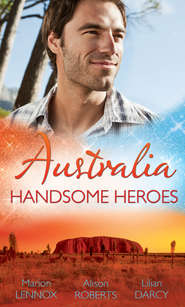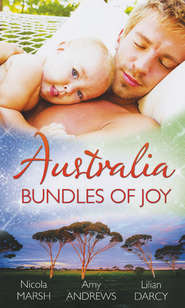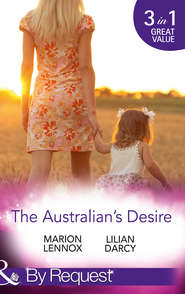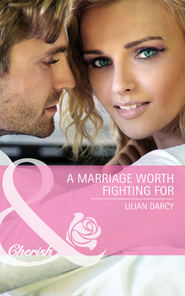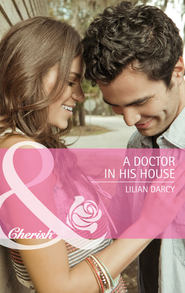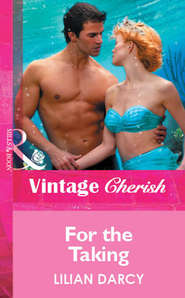По всем вопросам обращайтесь на: info@litportal.ru
(©) 2003-2024.
✖
The Australians' Brides: The Runaway and the Cattleman
Автор
Год написания книги
2019
Настройки чтения
Размер шрифта
Высота строк
Поля
“She looks heavy for you. Would she come to me?”
“It’s fine.” She smiled. “There’s nothing builds upper-arm strength as effectively as having a child, right? Better than an expensive gym. Thanks for sitting up with me, Callan.”
“No problem.”
For some reason, they both looked back at the couch, where the mohair blanket had half-fallen to the veranda floor, then they looked at each other. And suddenly Callan knew why she’d asked that question about his mother sleeping in the cottage, three hours ago, even if Jacinda herself still didn’t.
She’d unconsciously imagined how it would have looked to Mum if she’d happened to waken and find them sitting there together, under the same blanket, sharing the warm weight of Jacinda’s sleeping child.
His mother had given him a particular kind of privacy when he and Liz had been married, moving over to the cottage. When Liz had died, Mum hadn’t moved back. Somewhere in her heart, although she never spoke about it, she must hope he’d someday need that kind of privacy again. He should tell her gently not to hold her breath about it.
Chapter Five
“Saturdays and Sundays we don’t have school,” Lockie told Jac. He added, “It’s the weekend,” as if maybe Americans didn’t know what weekends were.
His explanation covered the wilder-than-usual behavior of both boys this morning, which Carly had latched on to within minutes of waking at six. They kept early hours at Arakeela Downs. This was Jac’s fourth awakening on the vast cattle station, and she had discovered that the dawns here were magical.
And chilly.
There was something satisfying about it. She would beat the predawn bite in the air by scrambling into layers of clothes, along with Carly, and head straight for the smell of coffee luring her toward the kitchen. Lockie, Josh and Callan would already be there, making a big, hot breakfast. Toast, bacon and fresh eggs with their lush orange yolks, or oatmeal and brown sugar, with hot apple or berry sauce.
They’d start eating just as the sun slid up over the horizon, and the colors of the rugged hills Jac could see from the kitchen windows would almost make her gasp. She and Carly would go out into the day as soon as they could. “To feed the chooks” was the excuse—Carly constantly referred to the hens as chooks, now; she’d be speaking a whole different language by the time they got back to the U.S.—but in reality, Jac just couldn’t bear to miss the beauty of this part of the day.
The bare, ancient rock glowed like fire, slowly softening into browns and rusts and purples as the sun climbed higher. Dew drenched the yellow grass, the vegetable garden, the fruit trees, and made spiderwebs look like strings of diamonds. Flocks of birds in pastel pinks and whites and grays, or bright yellows, reds and greens, rose from the big eucalyptus trees in the wide creek bed and wheeled around calling their morning cries. The air was so fresh, she felt as if simply breathing it in would be enough to make her fly.
When Lockie had managed to sit down at the table, after teasing the dogs along with Carly and Josh at the back door, Jac asked him, “So what happens at weekends?”
“We get to go out with Dad. Riding boundary, checking the animals and the water.”
Callan was listening. “Except today it’s not work, it’s a picnic,” he said. “We’re going to show Jacinda and Carly the water hole.”
“Can we swim?” Lockie asked. “Can we get yabbies?”
“Yeah!” Josh’s face lit up, too.
“Yabbies? What kind of a disease is that?” Jac asked the boys, grinning. It did sound like a disease, but from their eagerness she knew it couldn’t be.
“A really nasty one!” Lockie grinned back. “Don’t you have yabbies in America?”
“We’re pretty advanced over there. Doctors have already found a cure.”
“Yabbies you catch in the water hole and you cook them and eat them,” Josh said. He was a little more serious than his big brother, a little more prickly and slower to warm to the American visitors, with their accents that belonged on TV and their ignorance regarding such obvious things as yabbies.
“Like big prawns,” Callan said.
Setting silverware on the table, Jac looked up at him. “Shrimp?”
“Big freshwater ones.” He poured the coffee into two big mugs and added a generous two inches of hot milk to each. The two of them liked their coffee the same way. It was one of the simple, reassuring things they had in common. Not important, you wouldn’t think, but nice. “Yes, guys, we can swim and fish for yabbies,” he said. “If you and Carly want to go on a picnic, Jacinda, that is.”
He looked for her approval, courteous as always. They’d been over-the-top polite to each other since Tuesday night, and over-the-top careful about respecting each other’s space. Which was dumb, really, because space hadn’t been trespassed upon in any major way during those hours of moonlit talking on the veranda.
“If that’s not interfering with your routine.” Jac whacked the politeness ball right back over the net at him. She didn’t know quite why they were both doing it. For safety, obviously, but she didn’t really understand the source of the danger. “We’d love it.”
Carly was nodding and clapping her hands.
“Doing something different on a Saturday is our routine,” Callan said. “I like to check the water holes pretty often. Sometimes you get tourists leaving garbage, and you don’t want that, or a dead animal fouling the water. Good drinking water’s too important for the cattle and the wildlife out here.”
“That makes sense.” She found it interesting when he told her this kind of stuff, but also suspected that when he slipped into the tour-guide routine, it was another safety valve.
“So we’ll ride there, give the horses some serious exercise, take lunch, yabby nets, the whole kaboodle, light a fire, make a day of it. I’ll see if Mum wants to come, but she’ll probably stay at home.”
“She’s pretty amazing, your mom.”
“Yeah, and I spend half my time trying to get her to be less amazing.” He grinned, and relaxed. “Last flying doctor clinic we went to, that’s what the doc told her. You need to cut down on the amazing, Mrs. Woods, it’s pushing your blood pressure too high.”
The kitchen timer beeped, which meant their boiled eggs were ready, and the five of them sat down to breakfast.
Like a family, Jacinda decided.
No, she guessed it, really.
She’d never been part of a family in that way.
Callan somehow read this information like a teleprompter, directly from her forehead, because as they ate he asked her, over a background of kid noise, “So where did you grow up? Where is your family from? Did you live your whole life in L.A.?”
“No, New Jersey, until I was twelve. Very different from L.A. but just as urban. I’ve never been in a place like this.” She deliberately chose to focus on the geographical element of his questions, ignored the mention of family.
It didn’t work.
“Why did you move?” Callan asked next.
Uhh … “When my mom died.”
“Your dad didn’t want the memories in New Jersey?”
“No, Dad stayed. I was the one who moved.”
Okay, she was going to have to talk about it now, after giving him that revealing answer. It wasn’t so terrible. She believed in honesty and didn’t know why she was always so reluctant to unload this stuff. Because it made her sound too much like a stray mongrel puppy who’d never found the right home?
She hadn’t thought of it quite like this before, but it made a connection.
Kurt had treated her like a stray puppy. He’d scooped her up, after they’d met at a script-writing seminar when she was still incredibly naive and raw. He’d had her professionally groomed, house-trained her himself, put a diamond collar round her neck, spoiled her rotten …. And then he’d lost interest when she still didn’t perform like a pedigreed Best in Show.
Callan was waiting for her explanation.
“Dad didn’t believe he could raise a teenage daughter on his own, you see,” she said. “I have two brothers, but they’re much older. They were eighteen and sixteen when I was born. Dad’s seventy-eight now, and lives in a retirement home near my oldest brother, Andy.”
She’d had a very solitary childhood. Her parents had both been in their forties when she was born, unprepared for their accidental return to diapers, night feeds, noisy play and bedtime stories. They’d expected her to entertain herself and she’d mostly eaten on her own, in front of a book. And then Mom had died ….






